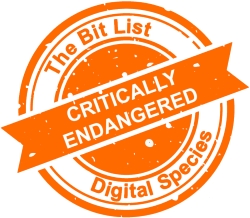Games with Offline Play Components
|
|
 |
|
|
This entry is focused on games that can be played offline, often those designed for single player play while in offline mode. This does not exclude games that can be played online or have online interactive components (e.g., Sims 3 can be played online or offline), but rather the focus is on the preservation of offline single player components over the online components. |
||
|
Digital Species: Gaming |
Trend for 2023:
|
Consensus Decision |
|
Added to List: 2019 (rescoped 2023) |
Trend for 2024:
|
Previously: Critically Endangered |
|
Imminence of Action Action is recommended within three years, detailed assessment in one year. |
Significance of Loss The loss of tools, data or services within this group would impact on a large group of people and sectors. |
Effort to Preserve | Inevitability It would require a major effort to prevent or reduce losses in this group, including the development of new preservation tools or techniques. |
|
Examples Sims 3, Planescape: Torment, Hades, The Elder Scrolls V: Skyrim |
||
|
‘Practically Extinct’ in the Presence of Aggravating Conditions Lack of skills, commitment or policy from corporate owners; complex hardware dependencies or bespoke hardware; dependence on obsolete, low usage operating systems with no emulation pathway; uncertainty over IPR or the presence of orphaned works; use of older magnetic media; loss of underlying code or gaming engine. |
||
|
‘Endangered’ in the Presence of Good Practice Emulation pathway; source code; trusted repository; large user community; IPR supportive of preservation; strong documentation. |
||
|
2023 Review This entry, alongside the ‘Games with Online Play Components’ entry, was created from rescoping the previous ‘Old or Non-current Video Games’ entry as part of the 2023 Bit List review. It was rescoped to highlight the differences in preserving offline components as opposed to online components in video games, specifically a lack of dependence on servers. |
||
|
2024 Interim Review The 2024 Council agreed these risks remain on the same basis as before, with no significant trend towards even greater or reduced risk (‘No change’ to trend). |
||
|
Additional Comments Whilst this has the same risk classification as the Games with Online Play Components entry, the risk could be considered to be slightly lesser due to the lack of reliance on servers as well as examples of games having their online services shut down but players still being able to access the offline game modes/features, such as the case with Nintendo discontinuing online services for Nintendo 3DS and Wii U software in early April 2024 where they explicitly state that “Players will still be able to use features and game modes that do not require online communication”. This entry is also interlinked with the entries covering games played on different hardware (Console games, PC games and smartphone games entries) as the risks can change based on this Case Studies or Examples:
See also:
|
||









































































































































